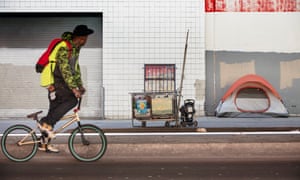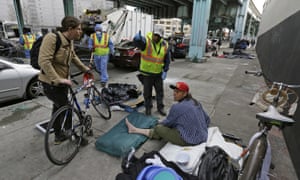Wealthy San Francisco tech investors bankroll bid to ban homeless camps

A tent on a sidewalk is the only place thousands of San Franciscans have to call home. But if a few of the city’s tech billionaires and millionaires have their way, even that shelter could be taken away.
Sequoia Capital chairman Michael Moritz, tech angel investor Ron Conway, and hedge-fund investor William Oberndorf have donated $49,999 apiece to a divisive ballot measure intended to clear San Francisco’s streets of homeless encampments, according to campaign filings.
Zachary Bogue, a tech investor best known as husband to the Yahoo CEO, Marissa Mayer, also pitched in $2,500.
Those sums may be chump change to the likes of Moritz (net worth $3.1bn), but they account for the majority of the approximately $270,000 campaign chest.
Proposition Q purports to address the most visible symptom of the city’s ongoing homelessness crisis, tent cities that crowd the sidewalks in certain neighborhoods. To the city’s housed residents, the encampments serve as a visceral reminder of the city’s gaping inequality – or as a nuisance that they wish would go away.
The proposed law would amend the city’s police code to ban tent encampments on city sidewalks. The city would be required to offer residents of an encampment 24 hours’ notice and a shelter bed or a bus ticket out of town, before being authorized to confiscate their tents and other belongings. The city would be required to store those belongings for up to 90 days.
“I strongly believe that it is not compassionate to allow human beings to live on our city streets,” wrote the measure’s author, supervisor Mark Farrell, in an op-ed. “Let’s help get the homeless into housing, not tents.”
Opponents of the measure point out that the proposed law does not include any funding for additional housing or shelters, and the city’s existing shelters have long waiting lists for beds.
“With Proposition Q, we’re just taking away someone’s tent and making them sleep on the cold concrete,” said Jennifer Friedenbach, executive director of the Coalition on Homelessness. “They’re not going to disappear.”
Moreover, city workers already perform regular sweeps of homeless encampments, often working with groups of residents living in specific areas over the course of a few days or weeks to place people in shelters.
Nathan Ballard, a spokesman for the campaign, said that the measure will provide the city with “one more tool which incentivizes homeless people to get out of the tents”.
“The incentive is the 24 hours’ notice,” he said.
The San Francisco Chronicle, which spearheaded a media campaign designed to urge city hall to seriously address homelessness, agreed that the measure would be ineffective and included it on their list of propositions that “don’t belong on SF’s ballot”.
Friedenbach argues that the campaign has nothing to do with homeless people, but is instead a tool being used by politicians looking to draw political distinctions in a one-party town.
“San Francisco is a liberal city, so the typical stuff they would use – anti-queer, anti-immigrant, racism, all the traditional wedges – don’t work,” she said. “Much like Trump is playing into the frustrations of Americans who are frustrated because their incomes aren’t keeping up with the cost of living, this is playing into the frustrations San Franciscans have with homelessness.”

Indeed, homelessness has been a reliably divisive issue in local elections for decades.
In 2003, the San Francisco Hotel Council ran a billboard campaign in support of an anti-panhandling law, that said that people who gave money to beggars had “supported a drug habit” or “helped spread STDs”. The Hotel Council is also backing Measure Q.
In 2010, Ron Conway was one of the primary donors to the campaign to pass a law that bans sitting or lying on the sidewalk during the day.
This type of anti-homeless, quality-of-life law is not effective in reducing homelessness. In May, a report by the city’s budget analyst found that enforcement of the city’s 36 quality-of-life laws cost more than $20m, while the number of unsheltered homeless continued to rise.
It does give politicians something to campaign about, though.
Moritz referred questions about his support for the measure to the campaign. Conway declined to comment when reached by phone. Oberndorf and Bogue did not immediately respond to queries.